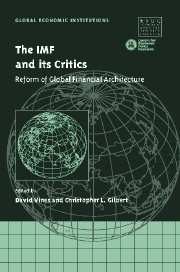Book contents
- Frontmatter
- Contents
- List of figures
- List of tables
- List of contributors
- Acknowledgements
- Introduction
- 1 The IMF and international financial architecture: solvency and liquidity
- 2 Progress towards greater international financial stability
- 3 International coordination of macroeconomic policies: still alive in the new millennium?
- 4 The Report of the International Financial Institution Advisory Commission: comments on the critics
- 5 Reforming the global financial architecture: just tinkering around the edges?
- 6 The IMF and capital account liberalisation
- 7 How should the IMF view capital controls?
- 8 The resolution of international financial crises: an alternative framework
- 9 Whose programme is it? Policy ownership and conditional lending
- 10 The IMF and East Asia: a changing regional financial architecture
- 11 The role of the IMF in developing countries
- 12 Argentina and the Fund: anatomy of a policy failure
- 13 Countries in payments' difficulties: what can the IMF do?
- 14 Accountability, governance and the reform of the IMF
- 15 The IMF at the start of the twenty-first century: what has been learned? On which values can we establish a humanised globalisation?
- Index
- References
7 - How should the IMF view capital controls?
Published online by Cambridge University Press: 04 December 2009
- Frontmatter
- Contents
- List of figures
- List of tables
- List of contributors
- Acknowledgements
- Introduction
- 1 The IMF and international financial architecture: solvency and liquidity
- 2 Progress towards greater international financial stability
- 3 International coordination of macroeconomic policies: still alive in the new millennium?
- 4 The Report of the International Financial Institution Advisory Commission: comments on the critics
- 5 Reforming the global financial architecture: just tinkering around the edges?
- 6 The IMF and capital account liberalisation
- 7 How should the IMF view capital controls?
- 8 The resolution of international financial crises: an alternative framework
- 9 Whose programme is it? Policy ownership and conditional lending
- 10 The IMF and East Asia: a changing regional financial architecture
- 11 The role of the IMF in developing countries
- 12 Argentina and the Fund: anatomy of a policy failure
- 13 Countries in payments' difficulties: what can the IMF do?
- 14 Accountability, governance and the reform of the IMF
- 15 The IMF at the start of the twenty-first century: what has been learned? On which values can we establish a humanised globalisation?
- Index
- References
Summary
Introduction
This chapter is a substantially revised version of Gilbert, Irwin and Vines (2001) in which the focus is on the implications of capital account liberalisation for the poorest developing countries.
The articles of agreement of the IMF, first drafted in 1945, include among their primary purposes the achievement of current account convertibility and trade liberalisation. In April 1997, the IMF announced its intention to alter its articles of agreement to widen its mandate to include capital account liberalisation. Since then a succession of financial and currency crises worldwide have led some to call into question the desirability of free international capital mobility and to advocate restrictions on capital flows (Rodrik, 1998). In this chapter, we assess how the IMF should view capital controls.
First, we discuss the extent to which countries should move towards capital account liberalisation. The focus is on developing countries as full capital account convertibility already exists in the developed countries. Our argument – in line with the climate of opinion since the crises in East Asia and elsewhere – is one in favour of caution. The reasons are partly sequencing (or ‘second-best’) ones, and partly that liberalisation can increase the vulnerability to financial crisis. Second, we discuss what role the IMF should play in facilitating the policy and institutional development identified in the first part of this chapter as necessary for the successful liberalisation of the capital account.
- Type
- Chapter
- Information
- The IMF and its CriticsReform of Global Financial Architecture, pp. 181 - 206Publisher: Cambridge University PressPrint publication year: 2004



